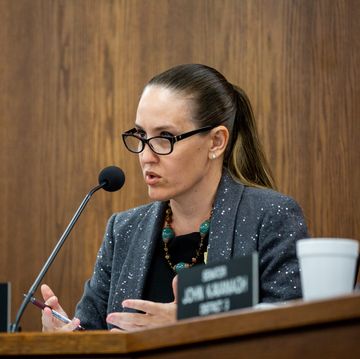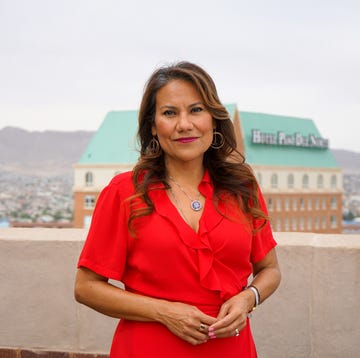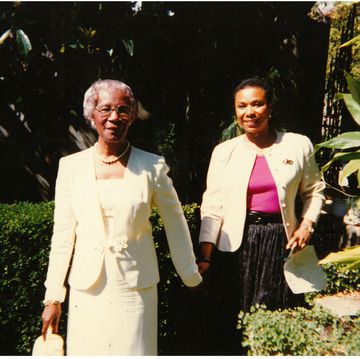Back in January, the Democratic Legislative Campaign Committee—the Democratic Party committee focused on winning state legislatures—declared that 2024 is “the most important election cycle in state legislative campaign history.” The why behind that statement has been playing out for years: Since the Supreme Court overturned Roe v. Wade in June 2022, Republican state legislators have taken it upon themselves to introduce and pass laws that not only restrict access to abortion care, but also threaten access to IVF and create an environment of fear for patients and doctors alike. That contrast between red and blue states has also been magnified in the way legislatures are debating LGBTQ+ rights, book bans, school curriculum, gun safety, and more.
Now, in a cycle where voters are wearily looking at the presidential race and having déjà vu, Heather Williams, president of the DLCC, offers state-level elections as a kind of antidote: a means of directly affecting your community and building political power from the ground up. “We’re going to see some benefit, of course, from the top of the ticket that’s going to affect our races, but we’re also going to see our candidates and our efforts support up-ticket, because we’re holding space for people at a time when things feel really hard,” Williams tells ELLE.com. Below, more from her on why, for Democrats, 2024 just might be “The Year of the States.”
Understandably, a lot of people are focused on Biden vs. Trump this election cycle, but the DLCC is also arguing that it’s shaping up to be “The Year of the States.” Why is that?
There are a few pillars to this. As a starting point, the fall of Dobbs put so much more attention on the states. Since then, Democrats have won elections, which is obviously very meaningful to us, but there has also been more of a spotlight on the kinds of nefarious things Republicans are doing in state Houses. Seeing and really taking Republicans at their word for the kinds of things they’re willing to do and then being able to pinpoint it to actions in the states, I think there’s more accountability.
The next pillar is our political map; the greatest opportunities for us to align nicely with the path of the presidency. Our priorities are making sure we’re holding the majorities in trifectas that we won in 2022. Then challenging the vulnerable Republican majorities in Arizona and New Hampshire, and building power through the different rungs in [other statehouses]. And then really trying to create opportunities through the decade in places like Georgia.
Our races are still won [by having] real conversations with voters. Our candidates and elected officials still live in their communities. So there is something very tangible about our campaign work, and about making Democrats three-dimensional and providing a visual counter to the chaos in Congress. We’re going to see some benefit, of course, from the top of the ticket. That’s going to affect our races, but we’re also going to see our candidates and our efforts support up-ticket, because we’re holding space for people at a time when things feel really hard. If you’re frustrated by a bunch of men in Washington, the three [state] House chambers that Democrats won in ’22 and ’23, they all elected Black speakers. We’re really finding candidates who are part of the fabric of these communities.
The DLCC has noted that the GOP has been very good at this kind of state-level work, whereas Democrats have not been playing the long game. But you all are trying to transform that.
This is a quick history lesson to get us where we are today: Republicans invested a bunch of money in state legislatures in 2010, and they completely changed the dynamic. Even if their care for the state landscape was solely about entrenching their federal power, they cared, they invested, and they moved their federal-focused donors and operatives into caring about the states, because they saw the connection to their whole ecosystem of power. I think Democrats have been playing some catch-up on that. Every four years, we focus so intensely on the presidential [election], and that’s such a big deal, and we start to lose focus on the infrastructure needed to build all the way down to the states.
That is changing, but we still have a deep desire for federal solutions for these really gnarly issues. Without question, I would love national protections for the LGBTQ+ community, but while we work towards that, these rights are either being created, preserved, protected, or taken away in real time in the states. And we’re trying to tell that story that it’s got to be an “and.” It can’t be an “or.” I think we’re better positioned than ever before; I think the importance of the states, and the way in which our agenda as Democrats and the president’s agenda is being moved in the states, is clearer.
Have there been state-level wins from the past few years that you find really exciting, but people might have missed?
I am so emotionally obsessed with Speaker Don Scott in Virginia. He’s a convicted felon, and he is now the speaker of the House in Virginia. He’s super humble about it, but it’s such an incredible story of decisions and change and evolution, and why representation in government matters so much. When you look at the bills that they introduced and the way he’s trying to lead and govern, you see justice as an underlying [principle].
In a different direction, what they’ve been able to do in Minnesota with their trifecta, it’s quiet and pragmatic. They’ve been able to address issues that have a deep impact on people’s lives, like free lunch for kids, trying to address the incredible burden and cost of child care. Their economic package doesn’t scream “economy,” but they’re the kind of policies that affect your family unit’s financial future and the kind of resources you have or don’t.
I feel like every time I speak with people about the upcoming elections, the sentiment is: I’m already tired. What is your response to that overwhelming feeling?
We’re really trying to tell the story of how much participation still really matters at this ballot level and creating almost a contrast to that apathy. We’ve had dozens of special elections across all the states, and those Democratic candidates have overperformed by an average of six points. What that is telling us—and what gives us hope in this environment—is that people are voting, right? They’ve got all kinds of feelings, as they should, as we all do, about the length of campaign season, about the rhetoric, about the drama, about the issues, about the fears, all the things. But when faced with that decision, Democrats are still voting. Now, we’re a long way away from Election Day. But we feel a deep responsibility in making sure that, in a rhetoric-filled environment, where there’s going to be enormous amounts of money, billions of dollars spent at the top of the ticket on paid communication, that our candidates are still humbled by the conversations [that come from knocking on] doors and showing up for people.
We’re going to win some of those races, we’re going to lose some of those races, but giving people a voice and a place to put their feelings is really important. The issues people care about are also decided in the states, and the impact that one can have by paying attention and voting and participating at this ballot level is enormous.
This interview has been edited and condensed for length and clarity.












